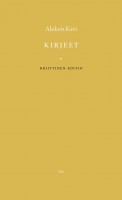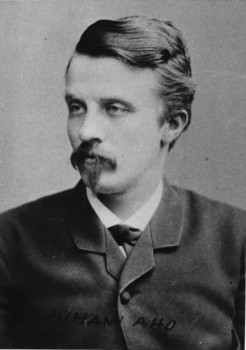Search results for "Lassi Nummi"
Aleksis Kivi: Kirjeet [Letters]
8 August 2013 | Mini reviews, Reviews
 Kirjeet
Kirjeet
[Letters]
Critical edition, edited by Juhani Niemi et al.
Swedish-language letters translated into Finnish by Juhani Lindholm and Ossi Kokko
Helsinki: Suomalaisen Kirjallisuuden Seura (the Finnish Literature Society), 2012. 426 p, two map drawings
ISBN 978-952-222-390-6
€ 43, paperback
In his poetry, plays and masterly novel Seitsemän veljestä (Seven Brothers, 1870), Aleksis Kivi (1834–72) laid the foundations of Finnish fiction. Kivi died an early death, impoverished and mentally ill. In this critical edition seventy of his letters and three letters received by him are presented with notes and an introduction. Most of the book consists of background articles and supplementary items. Professor Jyrki Nummi provides an interesting analysis of biographies of Kivi. The other authors discuss, for example the literature Kivi drew on in his own works: he had read world classics in Swedish, but in Finnish there was not yet much to read apart from the folk poetry. Other topics of discussion are Kivi’s skill in using Swedish – the language of the educated class in Finland – and what his letters reveal about his network of acquaintances. The letters are grouped in chronological order, with introductions by Professor Emeritus Juhani Niemi. Most of the letters are comparatively short, sent to relatives and friends. They reflect Kivi’s attitude towards his own work, as well as his worries about his financial situation and declining health.
Translated by David McDuff
Book-giving time!
12 November 2010 | In the news
 The few weeks before Christmas are when most books are bought in Finland, so shortlists of literary prizes start popping up in November.
The few weeks before Christmas are when most books are bought in Finland, so shortlists of literary prizes start popping up in November.
All the juries of the three biggest prizes – worth €30,000 each, awarded by the Finnish Book Foundation – have now published their shortlists: the Finlandia Prize for Non-Fiction, the Finlandia Junior Prize and the Finlandia Prize for Fiction.
The winners, each chosen by one person, will be announced in December. This FILI – Finnish Literature Exchange newsletter link will take you to the jury members’ assessments of the shortlisted non-fiction and Junior Prize works.
The following six novels ended up on the Finlandia Prize for Fiction list:
Joel Haahtela: Katoamispiste (‘Vanishing point’, Otava), Markus Nummi: Karkkipäivä (‘Candy day’, Otava), Riikka Pulkkinen: Totta (‘True’, Teos), Mikko Rimminen: Nenäpäivä (‘Nose day’, Teos), Alexandra Salmela: 27 eli kuolema tekee taiteilijan (’27 or death makes an artist’, Teos) and Erik Wahlström: Flugtämjaren (in Finnish translation, Kärpäsenkesyttäjä, ‘The fly tamer’, Schildts). Here’s the FILI link to the jury’s comments.
Coming up…
23 June 2011 | This 'n' that

Juhani Aho. Photo: SKS/Literary archives
After having read Juhani Aho’s sensual novella Yksin (‘Alone’, 1890), set in Paris, composer Jean Sibelius threatened to challenge its author to a duel.
The yearned-for loved one in the novella resembled Sibelius’s fiancée Aino Järnefelt, for whom author and journalist Aho had nursed an unrequited passion. (No duel ensued after all.)
This year marks the 150th year since Aho’s birth. An early modernist, Aho (1861–1921) was a versatile writer whose narrative skills have made him a classic. We shall feature extracts from Yksin – in Herbert Lomas’s translation, first published in Books from Finland in 2006 – along with a reappraisal of Aho’s work in the early years of the 20th century by Professor Jyrki Nummi.
L’Amour à la Moulin Rouge
Extracts from the novella Yksin (‘Alone’, 1890). Introduction by Jyrki Nummi
After dining at the Duval on the Left Bank I take the same route back and drop in at the Café Régence to flick through the Finnish papers they have there.
I find my familiar café almost empty. The waiters are hanging about idly, and the billiard tables are quiet under their covers. The habitués are of course at home with their families. Anyone who has a friend or acquaintance is sharing their company this Christmas Eve. Only a few elderly gentlemen are seated there, reading papers and smoking pipes. Perhaps they’re foreigners, perhaps people for whom the café is their only home, as for me.
A little way off at the other end of the same table is a somewhat younger man. He was there when I came in. He’s finished his coffee and appears to be waiting. He’s restless and keeps consulting his watch. An agreed time has obviously passed. He calms himself and lights a cigarette. A moment later I can see a woman through the glass door. She’s hurrying across the street in front of a moving bus and running straight here. Now the man notices her too, and he cheers up and signals to the waiter for the bill. The woman slips through the door and goes straight across to him. They altercate for a moment, come to an understanding and depart hand in hand. More…
